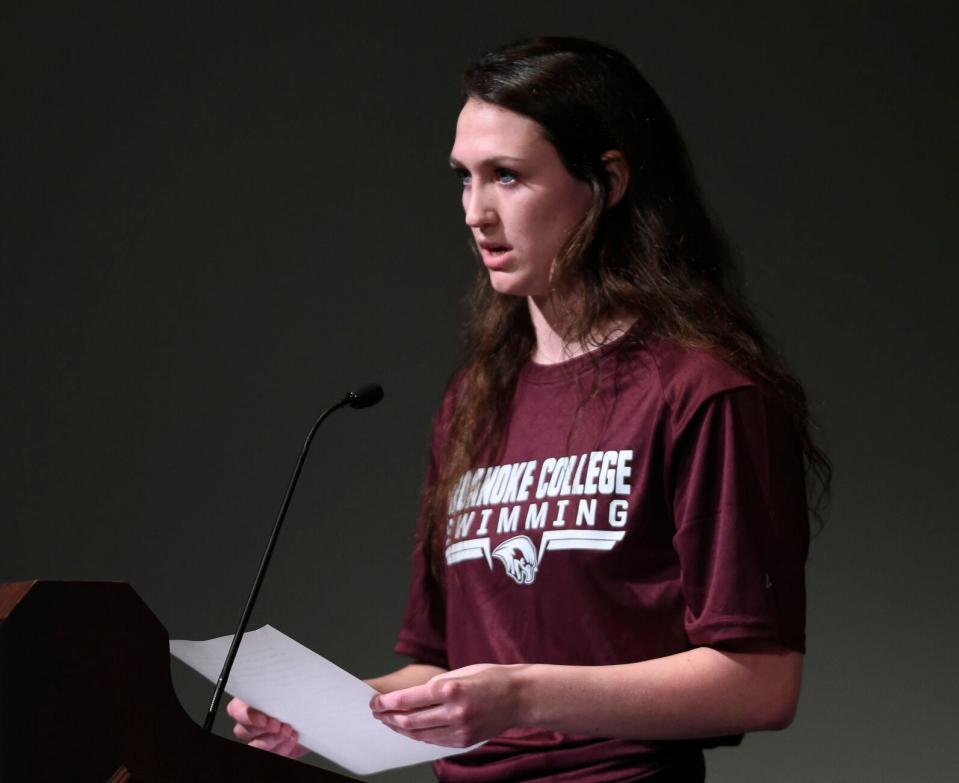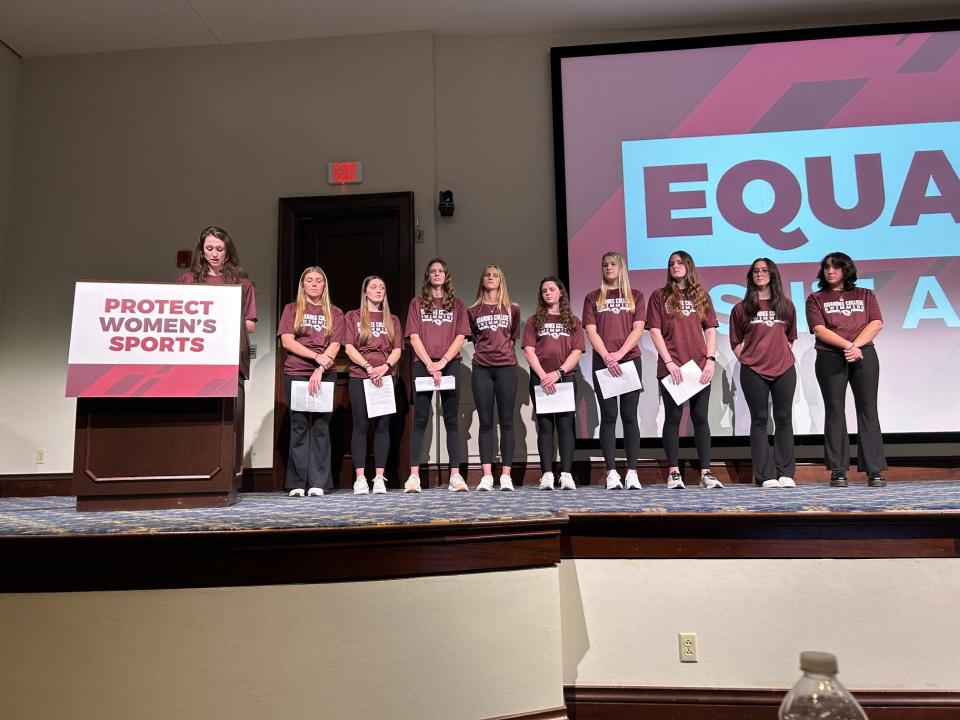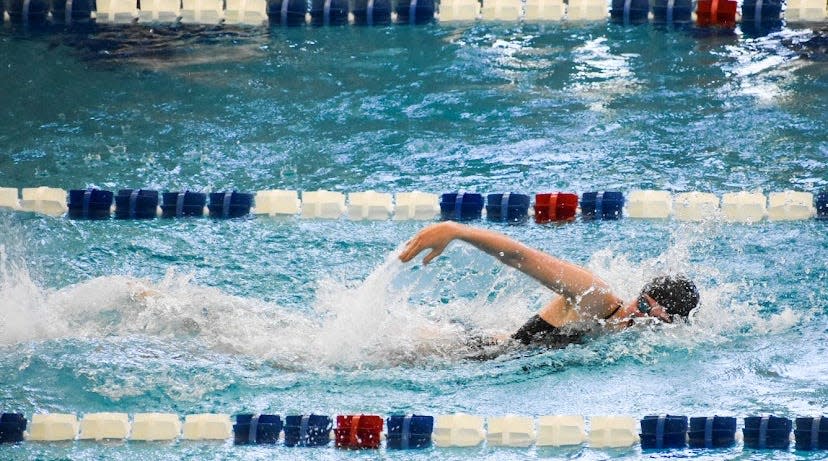Hoover High graduate joins national debate over trans women in swimming
Swimming put Lily Mullens in the Stark County sports spotlight.
Now the 2021 Hoover High grad and Roanoke College student-athlete is making headlines in the national debate over women's equality and transgender rights.
This summer, a fellow Roanoke swimmer who had competed with the men in Mullens' freshman year made a request that Mullens, now a 20-year-old junior, said profoundly unsettled her and her teammates. The swimmer, now a trans woman who has not been publicly identified, wanted to compete on the women's team.
The request unleashed a sequence of events that Mullens said led to her and her teammates having sleepless nights and losing their appetite. The team shared feelings of being emotionally blackmailed by the swimmer, who told members of the team that she felt unsupported and shared thoughts of suicide. The team also talked about an inability to concentrate on training, competition and school work.

Mullens said the small liberal arts college in Salem, Virginia, with an enrollment of less than 2,000 students, failed to take leadership, sought to avoid decisions, and tried to get the team and the swimmer to reach their own agreement. After a meeting between the team and the swimmer could not lead to a satisfactory compromise, the swimmer dropped her attempt to join the women's team.
Earlier this month, Mullens and nine of her teammates in a press event organized by advocacy organizations demanded that Roanoke College, the NCAA and USA Women's Swimming ban trans women from competing in women's swimming.
“The reason why I spent all that time in the water became unclear. Why would I even try to swim if I was going to have to race against a biological man?" said Mullens, who endorsed a bill pending in the Virginia legislature that would require people to compete in the athletic division based on their gender at birth. "My defeat was written in biology at that point. There was no heart or grit that could overcome the laws of nature."
But Mullens and her teammates now also are facing criticism from the LGBTQ+ community, which says the swimmers are "promoting baseless fears." There's also not enough scientific evidence concluding whether trans women do or do not have an advantage in swimming, experts say.

Lily Mullens and family take a stand
Mullens' mother, Cady Mullens, of Lake Township, spoke at the press event wearing a shirt that said, "Protect Women's Sports."
“It's not a trans issue. It's a fairness issue," she said, adding that trans women have the build, strength and lung capacity of a man. "They try to frame it that you’re anti-trans. They try to frame it in a manner that it's bigotry and it’s not at all.”
She connected her daughter to ICONS, or the Independent Council on Women's Sports which, with the Independent Women's Forum, set up the press event at a hotel near the college. ICONS said it seeks restricting women's sports to people born female.
📢 "Let our story be the final one told."
Listen to the Captain of the Roanoke College Women's Swim Team Lily Mullens share her story of swimming with a biological male on her team as she urges lawmakers & the NCAA to protect #FemaleAthletes & #SaveWomensSports. pic.twitter.com/ao2Ll96f8r— Independent Women's Forum (@IWF) October 12, 2023
When asked for a response to Mullens' comments at the press event, Roanoke College issued a statement by President Frank Shushock Jr. that said the college supports equity and inclusion.
"It pains me to know that anyone at the college felt marginalized as we gathered to sort out what is right for this college and this community," he said.
He said the board decided Oct. 3 to adopt the NCAA's final policy on the issue scheduled for the 2024-2025 academic year. The college said under that policy the trans woman who sought to swim with its women's swim team would not have been able to do so.
Attempts to reach the transgender student were unsuccessful.
The public stance of Mullens and her teammates has led to international attention. The Daily Mail tabloid in Britain wrote about the issue, as did the New York Post, and Mullens and some of her teammates have been interviewed by Fox News' Laura Ingraham. Expressions of support have come from Virginia Gov. Glenn Youngkin, who called the team, and former tennis great Martina Navratilova, who is gay.
Meanwhile, groups and local officials in western Virginia, in support of the transgender community, issued a letter titled "Hate Has No Place in Roanoke, Virginia." Referring to the advocacy groups and speakers who said they opposed swimming competitively against trans women, the letter said they "denounce the presence of national anti-transgender hate groups and speakers" at the press event.
“When we look at gender parity, in sports, especially collegiate athletics, you know, things like funding resources, pay equity, and more. But promoting baseless fears about trans athletes does nothing at all to address those real problems," Equality Virginia Executive Director Narissa Rahaman told television station WDBJ (Channel 7).
The Roanoke controversy isn't the first to hit women's swimming. University of Pennsylvania swimmer Lia Thomas became the first transgender woman to win an NCAA swimming championship in Division I in March 2022 and faced backlash for her accomplishment.
"The very simple answer is that I'm not a man. I'm a woman, so I belong on the women's team," Thomas told Sports Illustrated last year. "Trans people deserve that same respect every other athlete gets."

Lily Mullens: 'Unfair' advantage
Lily Mullens, a math major who competes in sprint events, said a person transitioning from male to female will always have an unfair competitive advantage in athletics against people who've been female since birth.
She echoed her mother's comments that a trans woman has the lung capacity, larger heart size, greater bone density, stamina and strength of a man.
Mullens said those who formerly swam in male competitions threaten to wipe out the records and athletic accomplishments of women like herself.
"If I have to get up on my block and look left and right and see a biological man, I’m really telling myself I’ve lost," she said. "Swimming is a very mental sport. ... Having that thought before you go race is detrimental for what you do.”
She stressed that she has no issue with people having gender transitions or trans athletes competing in the men's open division wearing female swimwear.
No scientific consensus on sports advantage
Earlier this year, Eric Vilain, a geneticist at the University of California, Irvine who studies gender-based biology, told Science that the number of studies published on performances by transgender athletes is not sufficient to come up with sound policies based on scientific evidence.
The article cited a study that found indications that four months of hormone therapy does reduce hemoglobin levels of trans women to levels similar to that of people who've been women from birth or cisgender women. The therapy after a year to 36 months also reduced certain measures of strength, muscle area and lean body mass but to levels above that of cisgender women.
But Vilain told Science that such studies of hemoglobin and muscle mass don't determine whether trans women have an advantage in sports like running, jumping or throwing.
The article also cited the findings of a medical physicist and trans woman runner who found that eight trans women after hormone therapy did not have an advantage over cisgender woman in endurance running despite undergoing puberty as a male.
Dr. Bradley Anawalt, an endocrinologist at the University of Washington School of Medicine, in a Q&A posted by the university said, "We don't have studies with large numbers of trans individuals, and we don't have studies that extend beyond one to three years. ... I worry that scientific facts will be used to bludgeon each other and that we won't come to a consensus because our feelings are so heightened."
He said some advantages like with height or hand size can't be undone by suppressing testosterone. And a trans woman could have a permanent advantage in sports like basketball or volleyball. But many advantages conferred during male puberty could be reduced if hormone therapy takes place before the completion of puberty. Anawalt expressed doubt that society could come to a consensus on a policy on the participation of transgender athletes that would widely be viewed as fair.
A study published in late 2020 found that 46 trans women in the Air Force about two years into hormone therapy were able to do 10% more pushups and 6% more situps than cisgender women. And trans women were 12% more faster on a 1.5-mile run. The study did not look at swimming performances. There's also questions raised about whether the timing of the fitness tests varied with each of the trans women, which might affect the data.

Related: 'They can find that right here.' First LGBTQ+ Resource Center in Stark County opens
Abby Henry: 'Fairness in women's sports also includes trans women.'
Advocates for the transgender community argue that it's crucial for the mental health of trans athletes that they be permitted to compete in the division that matches their gender identity and that they be accepted.
"Nobody wants to be against fairness in women's sports," said Abby Henry, executive director of Queer in Canton. "But trans women are women. So fairness in women's sports also includes trans women."
Vanessa Joy, 42, of Jackson Township, a trans woman who has declared herself a candidate for the Ohio House, opposes a sweeping ban on trans women competing in women's sports.
She said the small number of trans women competing are not going to radically alter women's athletics. Calling for policymakers to consult doctors who specialize in transgender care, Joy said policies should call for looking at each athlete on a case-by-case basis and ensure they've had sufficient hormone treatments to eliminate any unfair advantage.
With hormone treatments, “Your body changes. You lose a ton of muscle mass" and the trans woman is carrying around a heavier skeleton, Joy said. This is a “much bigger deal about it than it needs to be.“
Lily Mullens said, by raising her objection, she's looking beyond her own athletic career.
"If I have a daughter when I’m older and put in a sport ... and she has to compete against a biological male, I would never ever forgive myself because I went through it and I didn't say anything," she said.
Reach Robert at robert.wang@cantonrep.com. X formerly known as Twitter: @rwangREP.
This article originally appeared on The Repository: Hoover High grad Lily Mullens opposes trans women in women's swimming

